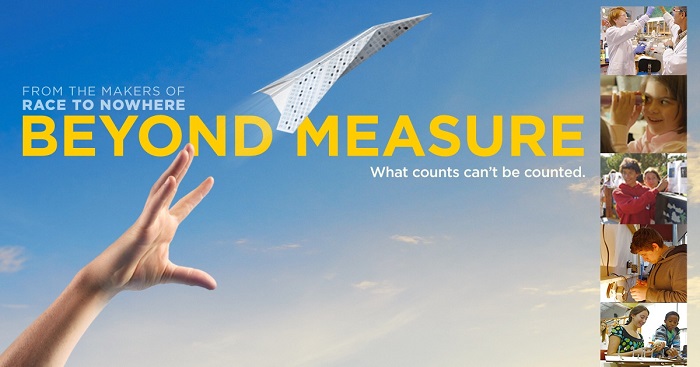On October 20, over 200 parents and community members gathered for a screening and panel discussion of Beyond Measure, an award-winning documentary, which outlines problems with our current education system and paints a picture of what’s possible in our schools. The film follows five public schools across the country “breaking away from an outmoded test-drive education [and] shaping a new vision for our classrooms.”
While many other education-themed films focus on shortcomings, including disparities in student achievement, low graduation rates and poor attendance, Beyond Measure looks at the innovations at work in school districts across the nation. Rather than asking why students are failing when tested and compared with peers, the film asks us to reconsider the greater purpose of education: What if our education system valued personal growth over test scores? What if it focused on project-based learning versus memorization or encouraged passion over rankings? What if we decided that the higher aim of school was not the transmission of facts, but the transformation of students?
The panelists for the evening included Dr. Elizabeth Coleman, former President of Bennington College, who led the university through an educational reformation; Dr. Beth Hennessey, Professor of Psychology at Wellesley College, who focuses her research on creativity and intrinsic motivation; and Dr. Jay Moody, Entrepreneur and Innovation Coach at Wayland High School.
The panelists concurred with the film’s theories and ideas, and they shared their thoughts on what our society needs to consider in order to improve the status of our educational infrastructure. Dr. Coleman stressed the importance of great teachers in education, noting that any approach to educational reform is only as good as the teachers who teach it. Dr. Hennessey added that it’s important that educators engage students in their own education, so that it will be individually relevant. Dr. Moody noted that while it is possible to have courses like the ones shown in Beyond Measure in our public schools, it would be very difficult to change completely to project-based coursework. The rest of the evening continued with lively discussion, with topics ranging from homework in elementary school to gap years for high school graduates.
With this grant, the five elementary school PTC’s have organized screenings of three additional films for the remainder of this school year. This will include a re-screening of Most Likely to Succeed and a screening and panel discussion of Race to Nowhere.

